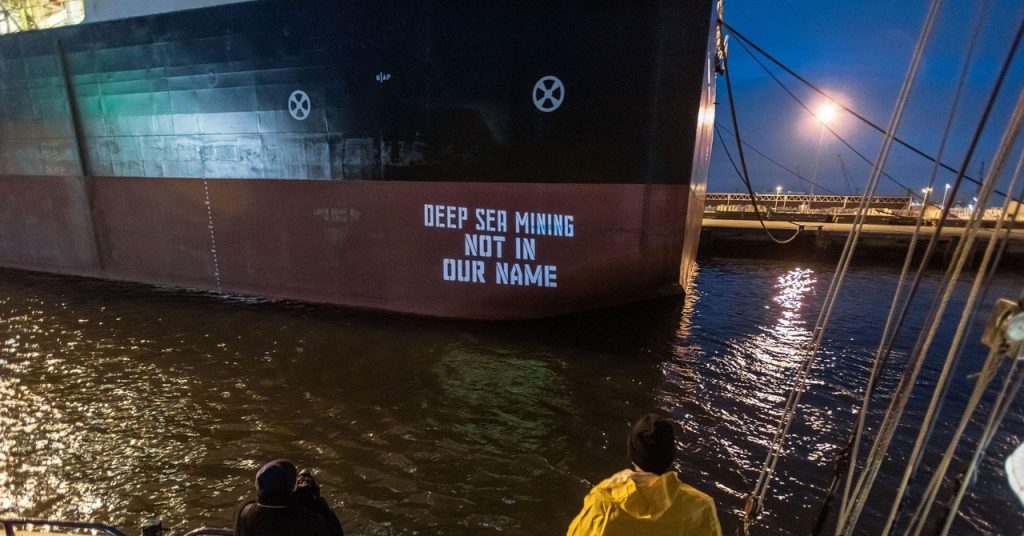Deep Sea Mining: A Double-Edged Sword
The Promise of Critical Minerals
Deep beneath the ocean floor lie valuable metals such as nickel, cobalt, lithium, and rare earth elements. These critical minerals are essential for manufacturing electric vehicle batteries, MRI machines, laptops, and even disposable vape cartridges. Political leaders and companies highlight the potential of these minerals to drive the transition away from fossil fuels, emphasizing their role in renewable energy technologies like EV batteries and solar panels.
Environmental Concerns
Despite the optimistic outlook, deep sea mining faces significant criticism from environmentalists and scientists. They warn that this practice, which has yet to begin on a large scale, could devastate one of the planet’s most remote and least understood ecosystems.
Public Backlash
Environmentalists, scientists, and even comedians like John Oliver have voiced strong opposition to deep sea mining. Oliver dedicated a segment of Last Week Tonight to the issue, highlighting the potential environmental disaster.
Alternative Solutions
Proponents of environmental conservation argue for prioritizing systems that reuse existing materials. This approach could help avoid the need for deep sea mining altogether. However, mining companies are preparing to start operations as soon as possible.
The Debate Over Deep Sea Mining
Norwegian Parliament’s Decision
In January 2024, the Norwegian Parliament is set to decide on whether to allow deep sea mining. The proposed method involves scraping the ocean floor with trawling systems to bring mineral-rich nodules to the surface. Environmentalists warn that this could severely impact marine life in the area.
Industry Perspective
Gerard Barron, CEO of The Metals Company, believes his efforts are misunderstood. He emphasizes the need for circularity in resource use, arguing that recycling is impossible without first extracting the necessary materials.
“We’re committed to circularity,” Barron says. “We have to drive towards circularity. We have to stop extracting from our planet. But the question is, how can you recycle what you don’t have?”
Environmental Toll
Both Barron and environmentalists agree that resource extraction always has an environmental cost. Barron suggests that it is better for this toll to occur in remote ocean areas rather than more biodiverse regions like rainforests.
“No matter what, you will be disrupting an ecosystem,” says Kelsey Lamp, ocean campaign director with the Environment America Research and Policy Center. “This is an ecosystem that evolved over millions of years without light, without human noise, and with incredibly clear water. If you disrupt it, the likelihood of it coming back is pretty low.”
The Future of Resource Management
Recycling and Circular Economy
Environmentalists argue that focusing on recycling and creating a circular economy can reduce the need for new resource extraction. Electronics manufacturing is growing five times faster than e-waste recycling, highlighting the need for better recycling infrastructure.
Balancing Extraction and Conservation
Barron believes that both recycling and responsible extraction are necessary. He argues that rejecting ocean mining means relying on other, potentially more harmful, sources of minerals.
“We need to do all of that,” Barron says. “You know, it’s not one or the other. We have to do all of that, but what we have to do is slow down destroying those tropical rainforests.”
Long-Term Vision
Proponents of a circular economy believe that broad, forceful measures can reduce the need for all forms of extraction, including deep sea mining. They argue that society must shift away from a consumption model that relies on constant extraction.
“We built this system that knows how to do one thing, which is take stuff out of the earth, put it into products and sell them, and then plug our ears and forget that they exist,” Proctor says. “That’s not the reality we live in. The sooner that we can disentangle that kind of paradigm from the way we think about consumption and industrial policy the better, because we’re going to kill everybody with that kind of thinking.”
Conclusion
Investing in a circular economy is challenging but necessary. While deep sea mining offers a seemingly abundant resource, it is ultimately finite. A sustainable future requires maximizing the use of existing materials and reducing the need for new extraction.
“If we treat these things as disposable, as we have, we’re going to need to continually refill that bucket,” Dutzik says. “If we can build an economy in which we’re getting the most out of every bit of what we mine, reusing things when we can, and then recycling the material at the end of their lives, we can get off of that infinite extraction treadmill that we’ve been on for a really long time.”

3 Comments
Questioning deep-sea mining’s sustainability isn’t just trendy—it’s crucial for our future.
Considering fixing over mining as a sustainable solution might just be the most logical approach yet.
Isn’t it time we invest in fixing our mess instead of creating new ones with deep-sea mining?